UCL and World AIDS Day
1 December 2008
The number of people living with HIV is rising around the world.
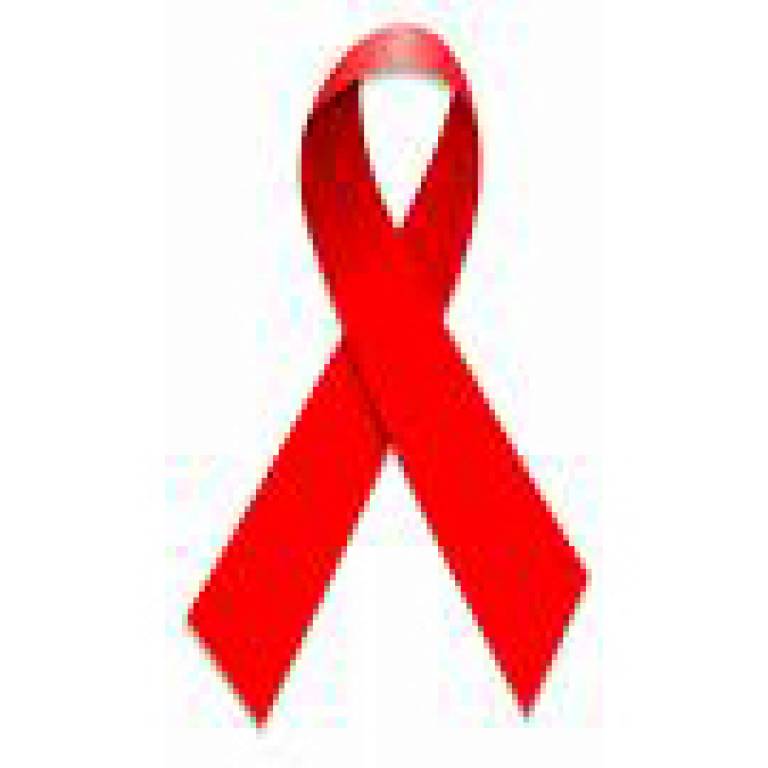 According to the National AIDS Trust, there are now 33 million people living with HIV worldwide, 80,000 of whom live in the UK. The UCL community is working to tackle the disease in a variety of ways, from improving our understanding of how cells become infected with HIV, through designing infection prevention strategies, to leading large-scale clinical trials across continents. Here a range of individuals across the university describe how their activities are contributing to the fight against HIV/AIDS.
According to the National AIDS Trust, there are now 33 million people living with HIV worldwide, 80,000 of whom live in the UK. The UCL community is working to tackle the disease in a variety of ways, from improving our understanding of how cells become infected with HIV, through designing infection prevention strategies, to leading large-scale clinical trials across continents. Here a range of individuals across the university describe how their activities are contributing to the fight against HIV/AIDS.
Anne Johnson, Professor of Infectious Disease Epidemiology, Head of the UCL Population Health, Co-Director of UCL's Institute for Global Health

There is a range of activity from my group and the Division concerned with combating HIV/AIDS. For example, Deenan Pillay, UCL Professor of Virology, won €10 million funding from the European Commission for a major Collaborative HIV and Anti-HIV Network (CHAIN), a programme encompassing 23 partners across Europe and Africa, to address the biology, epidemiology and clinical impact of drug resistance, and to devise new therapeutic and surveillance strategies to maintain the major benefit of treatment to infected individuals.
Another example is the MRC Clinical Trials Unit, led by Professor Janet Darbyshire, which hosts a major programme of research in collaboration with clinical colleagues at UCL. The Microbicide Development Project is an MRC/Department for International Development £30 million multidisciplinary trial involving partners in six African countries, with colleagues at Imperial and the London School of Hygiene & Tropical Medicine.
Recently, I was the co-author of a cohort study led by the Unit of over 15,000 people with HIV infection across Europe followed over time. It shows the enormous impact of therapy on improving clinical outcomes. Mortality rates for HIV-infected persons have become much closer to general mortality rates since the introduction of highly active antiretroviral therapy.
Professor Robin A Weiss FRS, Division of Infection & Immunity, UCL Medical School
In my laboratory, we study neutralising antibodies that block HIV infection, which will be an important feature of the development of HIV vaccines and microbicides (compounds which reduce infectivity), but is made difficult by the variation between HIV-1 strains. We are defining constant regions on the HIV-1 envelope that are targets for neutralisation by developing antibodies derived from immunised llamas and from HIV-infected persons.
We also study a mutation of Duffy antigen receptor for chemokines which occurs in about 90% of Africans but not in other peoples - it appears to increase the risk of acquiring HIV-1 infection when exposed. Our work is supported by the European Union, the Medical Research Council (MRC) and the Bill & Melinda Gates Foundation.
Professor Weiss has been a pioneer in the scientific understanding of HIV/AIDS, including identifying CD4 as its cell surface receptor, helping to develop the first HIV screening test for use in blood banks to prevent HIV transmission, and contributing to public health policy on the disease.
Thomas Locke and Faye Tierney, Co-Presidents of the UCL Student Stop AIDS Campaign (studying for intercalated BSc in International Health (UCL Institute of Child Health)
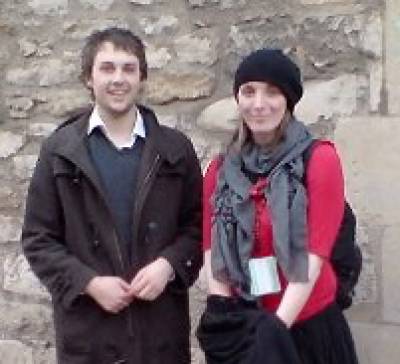
The UCL Student Stop AIDS Campaign is part of a nationwide group of university students who share a strong desire to change the course of the HIV/AIDS pandemic. We have been actively campaigning since 2003 to encourage the world's leaders to promote worldwide access to HIV/AIDS medication and increase investment in local health systems.
This year the campaign is
promoting patent pools, a simple system that may allow cheaper generic
HIV/AIDS medication to be produced. Join the Push for the Pool. Show your support for World Aids Day by coming to speak to us in the South Cloisters on 1 December or attending one of the social events or presentations. In 2009 we will be forming a permanent committee so now is an ideal time to get involved - please contact us for more information.
Claire Thorne, Lecturer/ Wellcome Trust Research
Career Development Fellow; Pat Tookey, Senior Lecturer in Paediatric
Epidemiology; and Claire Townsend, MRC Research Fellow (UCL Institute
of Child Health)
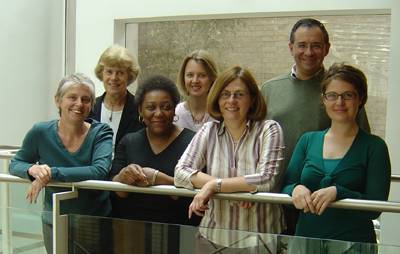
Back (from left): Catherine Peckham, Claire Townsend, Mario Cortina-Borja
Front (from left): Pat Tookey, Icina Shakes, Janet Masters, Barbara Willey
At the UCL Institute of Child Health, we work on several projects focusing on HIV in pregnant women and children. National surveillance of HIV in these populations is carried out through the UK and Ireland National Study of HIV in Pregnancy and Childhood (NSHPC). The European Collaborative Study on HIV-infected pregnant women and their children is also led from the Institute. Around 18,000 women and children have been reported to these two studies combined over the last 15-20 years.
Our research activities are focused
on mother-to-child transmission of HIV and its prevention, as well as
HIV infection in childhood. In the UK, screening for HIV has been
routinely offered in pregnancy since 2000, and most infected women are
now diagnosed in time to be offered treatment. This means that among
women who know they are HIV positive, the risk of mother-to-child
transmission is now very low, around 1%.
Other specific research interests include adverse effects of antiretroviral drugs in pregnancy and childhood, such as premature delivery and lipodystrophy syndrome (body fat redistribution and metabolic abnormalities) and the complex relationships between pregnancy, HIV disease progression and antiretroviral therapy. We have also recently set up a new multicentre cohort study of Ukrainian HIV-infected childbearing women to describe disease progression and treatment in this population.
Dr Ariberto Fassati, Research Department of Infection, UCL Infection & Immunity
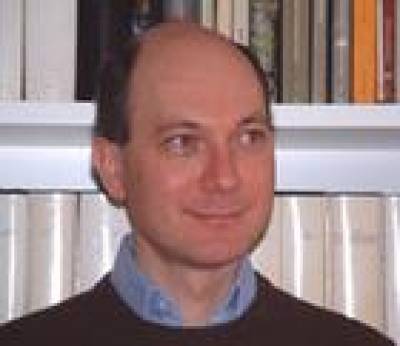
In my laboratory, we study the factors that are exploited by HIV-1 (the strain of the virus that causes the majority of AIDS cases) to replicate and in particular to traffic inside cells that host the virus. We use several approaches for this purpose that span cell biology, biochemistry, chemical biology and genetics.
We have recently discovered a new cellular pathway for tRNA retrograde transport into the nucleus of human cells - a pathway used by molecules engaged in a range of cellular functions - which is hijacked by HIV to access the nucleus of infected cells. We also use forward chemical genetics, a new method using small molecules as tools for basic biological research, to identify new 'druggable' cell host factors that are necessary for HIV-1 to replicate.
Our main long-term goals are to develop new classes of anti-HIV drugs and to discover fundamental cellular pathways involved in HIV replication. Our work is supported by the Wellcome Trust, the MRC and UCLH Charities.
Professor Mark Marsh, Cell Biology Unit, MRC-Laboratory for Molecular Cell Biology (UCL Biology)
The recent vaccine trial failures have led to a reappraisal of HIV/AIDS research priorities and the recognition that more basic research is necessary to establish a solid basis from which more effective vaccines might be developed. Together with collaborators in the US, we are attempting to understand some of the basic mechanisms involved in the replication of HIV and the closely related simian immunodeficiency virus. These studies suggest that manipulation of key sequences in the structural proteins of the virus can lead to the development of protective immune responses in animal models.
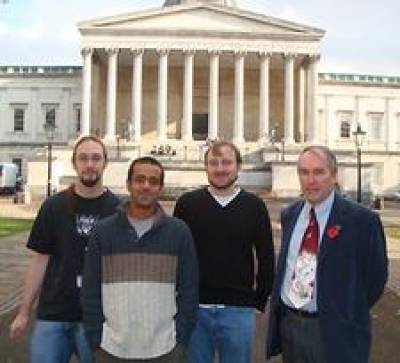
Professor Peter Coveney, Director of the Centre for Computational Science, UCL Chemistry
From left to right: Owain Kenway, Dr Kashif Sadiq, Dave Wright, Prof Peter Coveney
The clinical management of HIV-positive patients receiving existing drugs regimens is currently performed largely as a clinician's best guess, based on available viral and patient data. The Centre for Computational Science, however, is undertaking research that will enable us to progress beyond this. The group is stepping into the realm of prediction. We are developing a computational method that can both model and predict the efficacy of HIV treatment and the likelihood of drug resistance development in individual patients. Such a tool will not replace, but rather enhance clinical decision support for clinical practitioners and their patients.
Professor Ali Zumla, Director, UCL Centre for Infectious Diseases and International Health
The Centre for Infectious Diseases and International Health has a broad portfolio of research, training and capacity development on major killer diseases including HIV/AIDS, tuberculosis and respiratory infections spanning London, five European and nine southern African countries.
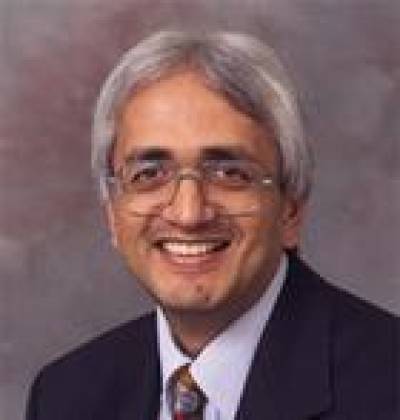
With regard to HIV/AIDS, our activities focus on:
- developing and evaluating 'biomarkers' of disease activity in HIV-infected adults with TB
- developing and evaluating newer diagnostics for use in HIV-infected children and adults with TB in Africa. This includes a unique test developed by the Centre of using urine to identify transrenal mycobacterial DNA for the diagnosis of TB
- conducting clinical trials of new anti-TB drugs regimens to reduce the duration of chemotherapy in HIV-infected and HIV-non-infected adults with TB
- conducting clinical trials on the optimal timing of antiretroviral chemotherapy in HIV-infected newly diagnosed adults with TB
- conducting clinical trials of antibiotic and adjunct immunotherapy trials for improving the treatment outcome of TB in HIV-infected individuals and in drug resistant TB.
Vishaal Virani, Medsin UCL Secretary and Editor of 'Perspectives', Medsin UCL Global Health Magazine
'Perspectives' is a student-led magazine that aims to raise awareness and provoke debate among the UCL community on the wider determinants of health. It is a part of Medsin, a wide network of students with an interest in health, whose activities aim to promote health as well as to act upon and educate students about health inequalities in our local and global communities.
The first issue of Perspectives released on 25 October featured an article on the battle between traditional and Western medicine in tackling AIDS in South Africa. The upcoming issue, available on 8 December, includes a case study of collaboration between traditional health practitioners and conventional medical doctors in South Africa and a feature on the issue of gender inequality in the HIV epidemic in Sub-Saharan Africa.
Dr John Richens, Clinical Specialist in STIs & HIV, Course Organiser of MSc in STIs & HIV
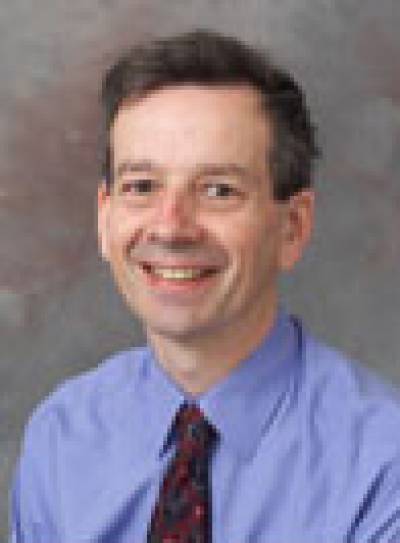
I am working with the World Health Organisation (WHO) on rolling out a new Global Strategy for the Prevention and Control of Sexually Transmitted Infections (STIs). I am currently drafting a regional plan for the WHO European region which extends right through Western Europe to republics of the former Soviet Union on the Chinese border. The control of other sexually transmitted infections is a key response to the HIV epidemic because the same risk behaviours are involved and because diseases like herpes and syphilis make HIV far more transmissible.
My hopes for 2009 are to see a shift of emphasis away from technological solutions to HIV transmission towards a greater emphasis on the societal issues that render the poor and marginalised sections of society so much more vulnerable to HIV than the better off.
Professor Chris Boshoff, Cancer Research UK Viral Oncology Group and Director of the UCL Cancer Institute
An alert
from the Centers for Disease Control and Prevention (CDC) in Atlanta on
the 5 June 1981, of Pneumocystis carinii pneumonia and Kaposi sarcoma
in young men from Los Angeles, heralded the AIDS pandemic. In the
early years of the epidemic, Kaposi sarcoma emerged from being a very
rare cancer, to being synonymous with this acquired immunodeficiency
syndrome.
The CR-UK Viral Oncology Group is
internationally known for its work on Kaposi sarcoma, and other
HIV-associated cancers. In sub-Saharan Africa, because of the HIV
pandemic, Kaposi sarcoma is now one of the most common cancer types
being diagnosed. This Group was the first to link a virus, Kaposi
sarcoma-associated herpesvirus, to all epidemiological forms of Kaposi
sarcoma: Kaposi sarcoma associated with HIV, with HIV-uninfected
children in Africa, with post-organ transplant immunosuppression and
with elderly HIV-negative men from Mediterranean countries with Kaposi
sarcoma.
The Group has made significant
contributions in understanding the epidemiology of the causative agent,
Kaposi sarcoma herpesvirus, and in deciphering the molecular mechanisms
of how this virus causes cancer. The Group most recently showed
that individuals with a mutation in a Toll-like receptor gene, encoding
for a protein involved in host immunity against this virus, are more
likely to develop another HIV-associated cancer, called multicentric
Castleman's disease (MCD). We also collaborate with scientists at
Birkbeck College and UCL Infection & Immunity, to identify the structures of viral-cellular protein interactions which could be targets for future therapies to treat Kaposi sarcoma.
Professor Mary Collins, Head of Division of Infection and Immunity; Director of the MRC/UCL Centre for Medical Molecular Virology
The goal of my research team is to engineer HIV viruses for experimental and clinical gene delivery. Recently we have developed production methods for these viruses, and have investigated the use of engineered HIV as a cancer vaccine. In 2009 I would hope we can engineer yet more effective vaccine viruses. Vaccines that work in a model system in the laboratory must be very finely tuned to have a chance in the clinic.
Professor Andrew Phillips, Research Department of Infection & Population Health

Activity on HIV in the Research Department of Infection & Population Health spans understanding risk behaviour, transmission dynamics, prevention, and treatment and clinical care. In the latter area (treatment and clinical care), ongoing work on large cohorts and trials has helped us understand the negative consequences of antiretroviral drugs such as resistance development and adverse drug effects.
A surprising development over the past 1-2 years has been the emerging evidence that HIV appears to increase risk of a much wider range of diseases than had previously been appreciated - including cardiovascular events, liver cirrhosis, end-stage renal disease and non-AIDS malignancies. This has led to a paradigm shift of how we think about HIV and is part of the rationale for a new worldwide trial of very early initiation of therapy, to start in 2009.
COMMENTS? Contact Lara Carim, UCL Communications
HIV today poses very different problems than it did 25 years ago. Back then there were few treatment options and little understanding, which spawned fear, mistrust and discrimination. Today the scientific advancements have been exponential but the fear and individual ignorance live on.
People in positions of responsibility must now make a stand and prioritise HIV. Medical response has been swift and effective but the social, political and legal lag far behind. We have not yet caught up with the changing face of HIV in 2008 and must work harder to gain a clear strategic vision of our response to the epidemic in the future.
Dr Christian Jessen, UCL Medical School (2000): general medicine, infectious disease, travel medicine and sexual health/HIV; general medicine and sexual health practitioner; writer and TV commentator
The Elton John AIDS Foundation (EJAF), which has operations in the UK and USA, is one of the largest HIV/AIDS charities in the world, having raised over $160m in its 15 year history.
Since I first became involved in the EJAF, the role of both the US and UK Foundations has changed and expanded dramatically. What began as support for HIV prevention campaigns, and 'top up' funding in end-of-life care for people living with HIV/AIDS, principally in the UK and US, has expanded to supporting work across Africa, Asia, Europe, North and South America and the Caribbean.
With real gains in HIV/AIDS treatment, EJAF has been able to amplify fledgling ARV treatment programmes for adults and children in Botswana, Kenya, South Africa and now Malawi, Tanzania and Lesotho.
An increasing understanding of how the AIDS crisis is affecting children has seen the expansion of holistic support to so-called 'AIDS orphans' and children made extra vulnerable to the disease. EJAF has also broadened work with women: to prevent them from becoming infected with the disease and to prevent those infected from passing it to their unborn children.
The US Foundation, of which I am a Board member, has embarked on an ambitious programme of work in Latin America and the Caribbean. Both US and UK Foundations also continue to champion and support the needs of highly vulnerable populations at home: men who have sex with men, drug users and youth.
I am proud to be associated with this work and to know that EJAF is making a really tangible difference in the fight against this deadly disease.
Lyn Rothman, UCL Honorary Fellow 2008 and Patron of the Elton John AIDS Foundation
 Close
Close

